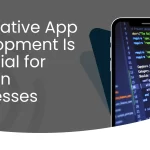Native vs. Cross-Platform Mobile Apps: Which One is Right for Your Business?
In today’s mobile-first world, businesses must choose the right approach when developing a mobile app. Two of the most common methods are native app development and cross-platform app development. Both have their advantages and disadvantages, and the right choice depends on your goals, target audience, budget, and timeline. In this blog, we’ll explore the key differences between these two approaches to help you make an informed decision. Native vs Cross-Platform Mobile App Development.
What are Native Mobile Apps?
Native mobile apps are developed specifically for a single platform, such as iOS or Android, using the platform’s native programming languages and development tools. For iOS, this typically means using Swift or Objective-C, while Android apps are built using Java or Kotlin. Native apps are installed directly on a user’s device, allowing them to utilize the device’s hardware and software features like GPS, camera, and sensors.
Advantages of Native Mobile Apps
- Optimized Performance
Native apps deliver the best performance because they are designed specifically for the platform they are built for. The app runs smoothly, with minimal delays or lag. - Access to Full Device Features
Native apps can fully integrate with the platform’s hardware and software, providing better access to device features such as the camera, GPS, Bluetooth, and sensors. - Superior User Experience (UX)
Since native apps follow the platform’s specific design guidelines, they offer a seamless and intuitive user experience that feels natural to iOS or Android users. - Faster Updates and Bug Fixes
Native apps can receive updates and bug fixes directly through the platform’s app store (Apple App Store or Google Play Store), ensuring quick resolution of issues.
Disadvantages of Native Mobile Apps
- Higher Development Costs
Developing separate apps for iOS and Android requires two different codebases, which can increase both development time and costs. - Longer Development Time
Building and maintaining separate apps for each platform means more time is spent on coding, testing, and debugging, delaying time-to-market. - Resource Intensive
You need dedicated teams for both iOS and Android development, making it more resource-intensive compared to cross-platform development.
What are Cross-Platform Mobile Apps?
Cross-platform mobile apps are developed using a single codebase that can run on multiple platforms, such as both iOS and Android. Technologies like React Native, Flutter, and Xamarin allow developers to write the app once and deploy it across various platforms, using a shared codebase.
Advantages of Cross-Platform Mobile Apps
- Faster Development Time
Since a single codebase can be used for both iOS and Android, cross-platform apps generally have shorter development cycles, making them ideal for businesses looking to launch quickly. - Lower Development Costs
Developing one app for both platforms reduces costs, as there is no need to build and maintain separate codebases for iOS and Android. - Consistency Across Platforms
A single codebase ensures consistency in features and design across both platforms, delivering the same user experience on iOS and Android. - Wide Reach with Limited Resources
Cross-platform apps allow businesses to reach users on both iOS and Android without needing two different teams or large resources.
Disadvantages of Cross-Platform Mobile Apps
- Limited Access to Device Features
While cross-platform frameworks have evolved, they still have limitations when it comes to accessing advanced device features and capabilities. This can lead to performance issues or a lack of certain functionality. - Potential Performance Issues
Since cross-platform apps rely on frameworks that translate the code for multiple platforms, they may experience slightly reduced performance compared to native apps, especially for resource-intensive applications like gaming or augmented reality. - Dependence on Third-Party Frameworks
Cross-platform app development relies heavily on third-party frameworks (e.g., React Native, Flutter). If these frameworks are updated or changed, the app might require additional maintenance or modification.

Which One Should You Choose?
Choosing between native and cross-platform app development depends on various factors such as the complexity of the app, budget, timeline, and the features you require. Here are some key considerations:
- For High Performance & Native Features:
If your app requires deep integration with the device hardware (e.g., advanced camera features, GPS, or sensors) and needs the highest performance, a native app is the better choice. - For Faster Launch & Budget-Friendly Development:
If you’re looking to develop an app for both iOS and Android with a lower budget and shorter time-to-market, a cross-platform app is a great option. - For Scaling in the Future:
Native apps are ideal for scaling up and offering advanced features in the long run. If you foresee needing complex functionality or higher performance, go with native development. - For Simpler Apps with Less Complexity:
For simple apps with basic functionality, such as informational apps, cross-platform apps may offer the right balance of performance and cost.
Conclusion
Both native and cross-platform app development have their pros and cons. The choice ultimately comes down to your project requirements, budget, timeline, and user expectations. While native apps provide superior performance and access to device features, cross-platform apps offer a faster, more cost-effective solution for businesses targeting both iOS and Android platforms.
By understanding the strengths and limitations of each, you can make a well-informed decision and choose the development approach that aligns best with your goals.









